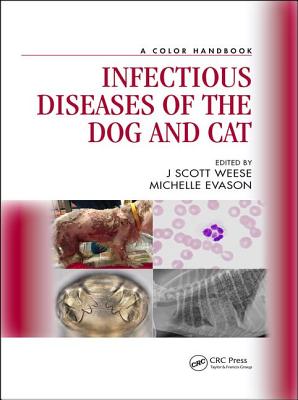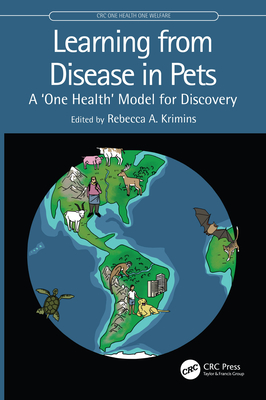Core Competencies of a Veterinary Graduate
Verma, Subhash, Malik, Yashpal Singh, Singh, Geetanjali
- 出版商: Springer
- 出版日期: 2024-04-14
- 售價: $7,750
- 貴賓價: 9.5 折 $7,363
- 語言: 英文
- 頁數: 293
- 裝訂: Hardcover - also called cloth, retail trade, or trade
- ISBN: 9819704324
- ISBN-13: 9789819704323
海外代購書籍(需單獨結帳)
相關主題
商品描述
This book is an essential guide for veterinarians, veterinary faculty and policymakers for understanding the core competencies of a fresh veterinarian. The book briefly covers competencies in preclinical, paraclinical, and clinical subjects including anatomy, physiology, biochemistry, veterinary jurisprudence, animal management & welfare including nutrition and breeding, infectious and non-infectious diseases, disease epidemiology, diagnosis, and treatment, prevention, control and zoonoses, surgical and other clinical interventions. The book further includes other competencies, including biologicals, anti-mortem, and post-mortem inspection, certifications, applied one health aspects, review and analysis of scientific evidence, international trade and regulations, and organization of veterinary services. It also highlights the importance of effective communication, interpersonal skills, record keeping and management of a small veterinary hospital, health informatics, etc. The book breakdowns the must-have competencies of a global veterinarian into different topics and subtopics for easy comprehension and further learning. It enables the professional standard-setting & regulatory bodies and academicians in improved curricula designing and implementation and more importantly tries to bring uniformity in day one veterinary graduates' competencies globally, enhancing the movement and employability of veterinarians across the world.
商品描述(中文翻譯)
這本書是一本對於獸醫、獸醫教職員和政策制定者來說至關重要的指南,用於了解新鮮獸醫的核心能力。該書簡要介紹了預臨床、臨床和臨床科目的能力,包括解剖學、生理學、生物化學、獸醫法學、動物管理與福利(包括營養和繁殖)、傳染性和非傳染性疾病、疾病流行病學、診斷和治療、預防、控制和人畜共患病、手術和其他臨床干預措施。該書還包括其他能力,包括生物製品、活體檢查和死後檢查、認證、應用一個健康方面、科學證據的回顧和分析、國際貿易和法規、以及獸醫服務的組織。它還強調了有效溝通、人際技巧、記錄保存和小型獸醫醫院的管理、健康信息學等的重要性。該書將全球獸醫的必備能力分解為不同的主題和子主題,以便於理解和進一步學習。它使專業標準制定和監管機構以及學者能夠改進課程設計和實施,更重要的是,試圖在全球範圍內提高首日獸醫畢業生的能力水平,增強獸醫在全球范圍內的流動性和就業能力。
作者簡介
Dr. Subhash Verma has an extensive 25-year career in various professional capacities. Currently positioned as a professor of veterinary microbiology and heading both the veterinary parasitology department and the veterinary emergency response unit-north zone at the Veterinary College in Palampur, Himachal Pradesh, India, he also serves as an associate editor for an international journal. Formerly, he led the fisheries department for approximately five years at Chaudhary Sarwan Kumar (CSK) Himachal Pradesh Agricultural University. After completing his undergraduate veterinary degree, Dr. Verma pursued a master's in veterinary microbiology, followed by a second master's in immunopharmacology with distinction at the University of Strathclyde, Glasgow, under a British Chevening Scholarship. He obtained an Overseas Research Scholarship for a Ph.D. in Immunogenetics from the University of Glasgow and conducted a Postdoctoral Fellowship at the Wellcome Centre of Molecular Parasitology, Glasgow. Recognized as a Fellow of the National Academy of Veterinary Sciences, India, Dr. Verma has significantly contributed to scientific research. His achievements include deciphering cattle antibody diversity mechanisms, pioneering the functional assessment and mapping of cattle activation-induced cytidine deaminase, characterizing virulent determinants, and developing an indirect ELISA for P. multocida. He also played a key role in creating and characterizing the AprV2 nanovaccine against Footrot. His research output comprises numerous high-quality papers, books, book chapters, manuals, sequences and microbes submitted to international and national repositories.
Prof. Yashpal Singh Malik is serving as the Dean of the College of Animal Biotechnology, Guru Angad Dev Veterinary and Animal Sciences University, Ludhiana, India. He is a recipient of the prestigious position "ICAR National Fellow" at the ICAR-Indian Veterinary Research Institute. His areasof expertise are rotaviral diseases, viral disease epidemiology, microbial biodiversity, host-virus interactions, and pathogen-diagnostics. He has pursued advanced studies in molecular virology at the University of Minnesota, USA; University of Ottawa, Ontario, Canada; and Wuhan Institute of Virology, Wuhan, China. Prof. Malik is serving as the chair picobirnavirus family at the World Health Organization. He is the recipient of several prestigious national, state and academy awards and honours, including the ICAR-Jawaharlal Nehru Award. He has authored several books and book chapters, and various research and review articles. Prof. Malik has been associated with societies of international repute, like, the Secretary General of the World Society for Virology, Federation of Asian Veterinary Association, World Veterinary Association, International Committee for Taxonomy of Viruses and at national level serving as Secretary General of Indian Virological Society. Prof. Malik is the series editor for Springer's "Livestock Disease Management" book series. He is the Editor-in-Chief of various journals. He has been awarded a prestigious Fellowship by the Academy of Microbiological Sciences, National Academy of Veterinary Sciences and National Academy of Dairy Sciences.
Dr. Geetanjali Singh is professor and head in the Department of Veterinary Physiology and Biochemistry, Dr GC Negi College of Veterinary and Animal Sciences, CSK Himachal Pradesh Agricultural University, Palampur, India. She has earlier served as an assistant professor of animal nutrition & a veterinary officer in the government sector. She was a visiting associate professor at University of Queensland, Brisbane, Australia and eco development specialist in Indo German Eco Development project run by Indian and German Governments in lower Himalayan region of India. After graduating as a vet and specializing in animal nutrition she pursued her Masters in Applied Biomolecular Technology from University of Nottingham, UK and PhD in Medical Biochemistry and Molecular Biology from University of Glasgow, UK. Her research interests include early biomarker of diseases & biochemical and molecular characterization of native animal breeds. She has been conferred with various prestigious awards notably, Commonwealth Award by the Department for International Development, United Kingdom, Wellcome Trust Value in People Award, Rapid Grant for Young Investigator by Department of Biotechnology India and Woman Scientist Award by Indian Society for Veterinary Immunology and Biotechnology etc. She is on the panel of mentors of commonwealth students and has worked as principal investigator and co-principal investigator in many research projects. She has more than 20 years of teaching experience in the field of Veterinary Biochemistry and Animal Nutrition. She has published in the peer-reviewed journals and co-authored books and book chapters.
Dr. Prasenjit Dhar is currently working as a Professor in the Department of Veterinary Microbiology, Dr GC Negi College of Veterinary & Animal Sciences, Himachal Pradesh Agricultural University, Palampur, Himachal Pradesh, India. His research interests are in molecular diagnosis of viruses of companion animals and microbiology of fishes. He has served as referee for a number of journals. He has served in the state animal husbandry department as well and worked as a subject matter specialist in regional research station of Himachal Pradesh Agricultural University, Palampur. He has more than 20 years of teaching experience in Microbiology, Virology and Immunology. He has also published more than 50 research articles in peer-reviewed Indian and International journals. He is a member of various associations like IAVMI, IAAVR, IVS, ISACP etc.
Dr. Amit Kumar is working as Assistant Professor in the Department of Veterinary Surgery and Radiology. Dr GC Negi College of Veterinary and Animal Sciences, CSK Himachal Pradesh Agricultural University, Palampur since Jan, 2009. He has a special interest in Veterinary Orthopaedics (Biological Osteosynthesis), Diagnostic Imaging (Endoluminal Imaging) and development of field friendly balanced anesthetic protocols in animals. He had handled 7 research projects so far as either PI or Co-PI. He has guided 7 postgraduate students as a major advisor and 6 are working under him at present. He had published 66 research and clinical articles so far and attended 17 National and 1 International conferences. He has also contributed in 12 professional books/manual/compendium & bulletins.
作者簡介(中文翻譯)
Dr. Subhash Verma在各種專業職位上擁有廣泛的25年職業生涯。目前擔任印度喜馬偕爾邦帕蘭普爾獸醫學院獸醫微生物學教授,並領導獸醫寄生蟲學系和獸醫緊急應變單位-北區。他還擔任國際期刊的副編輯。在此之前,他在查德哈里·薩爾旺·庫馬爾(CSK)喜馬偕爾邦農業大學領導漁業部門約五年。在完成獸醫學士學位後,Verma博士在英國Chevening獎學金的支持下,在格拉斯哥大學獲得獸醫微生物學碩士學位,並在格拉斯哥大學獲得免疫藥理學碩士學位。他獲得了格拉斯哥大學的海外研究獎學金,獲得了免疫遺傳學博士學位,並在格拉斯哥的威康分子寄生蟲學中心進行了博士後研究。作為印度國家獸醫科學院的院士,Verma博士在科學研究方面做出了重要貢獻。他的成就包括解析牛抗體多樣性機制,開創性地評估和映射牛活化誘導胞嘧啶脫氨酶,表徵致病因子,並開發了間接ELISA檢測P.multocida。他還在創建和表徵對抗蹄腐病的AprV2納米疫苗方面發揮了關鍵作用。他的研究成果包括大量高質量的論文、書籍、書籍章節、手冊、提交給國際和國家資料庫的序列和微生物。
Prof. Yashpal Singh Malik現任古魯·安格德·德夫獸醫和動物科學大學動物生物技術學院院長,位於印度盧迪亞納。他是印度獸醫研究所的“ICAR國家研究員”職位的得主。他的專業領域包括輪狀病毒疾病、病毒疾病流行病學、微生物生物多樣性、宿主-病毒相互作用和病原體診斷。他曾在美國明尼蘇達大學、加拿大安大略省渥太華大學和中國武漢病毒學研究所進行分子病毒學的高級研究。Malik教授擔任世界衛生組織的picobirnavirus家族主席。他獲得了多個國家、州和學院的重要獎項和榮譽,包括ICAR-Jawaharlal Nehru獎。他撰寫了多本書籍和書籍章節,以及各種研究和評論文章。Malik教授與國際知名學會有著密切的聯繫,如世界病毒學學會秘書長、亞洲獸醫聯合會、世界獸醫聯合會、國際病毒分類委員會,以及在國內擔任印度病毒學會秘書長。Malik教授是Springer的“牲畜疾病管理”書系的系列編輯。他是多個期刊的主編。他獲得了微生物科學院、國家獸醫科學院和國家乳品科學院的重要研究員職位。
Dr. Geetanjali Singh是印度帕蘭普爾的Dr GC Negi獸醫和動物科學學院獸醫生理學和生物化學系的教授和系主任。她曾在政府部門擔任動物營養助理教授和獸醫官員。她曾在澳大利亞昆士蘭大學布里斯班校區擔任訪問副教授,並在印度和德國政府在印度下喜馬偕爾邦下喜馬偕爾邦下喜馬偕爾邦下喜馬偕爾邦下喜馬偕爾邦下喜馬偕爾邦下喜馬偕爾邦下喜馬偕爾邦下喜馬偕爾邦下喜馬偕爾邦下喜馬偕爾邦下喜馬偕爾邦下喜馬偕爾邦下喜馬偕爾邦下喜馬偕爾邦下喜馬偕爾邦下喜馬偕爾邦下喜馬偕爾邦下喜馬偕爾邦下喜馬偕爾邦下喜馬偕爾邦下喜馬偕爾邦下喜馬偕爾邦下喜馬偕爾邦下喜馬偕爾邦下喜馬偕爾邦下喜馬偕爾邦下喜馬偕爾邦下喜馬偕爾邦下喜馬偕爾邦下喜馬偕爾邦下喜馬偕爾邦下喜馬偕爾邦下喜馬偕爾邦下喜馬偕爾邦下喜馬偕爾邦下喜馬偕爾邦下喜馬偕爾邦下喜馬偕爾邦下喜馬偕爾邦下喜馬偕爾邦下喜馬偕爾邦下喜馬偕爾邦下喜馬偕爾邦下喜馬偕爾邦下喜馬偕爾邦下喜馬偕爾邦下喜馬偕爾邦下喜馬偕爾邦下喜馬偕爾邦下喜馬偕爾邦下喜馬偕爾邦下喜馬偕爾邦下喜馬偕爾邦下喜馬偕爾邦下喜馬偕爾邦下喜馬偕爾邦下喜馬偕爾邦下喜馬偕爾邦下喜馬偕爾邦下喜馬偕爾邦下喜馬偕爾邦下喜馬偕爾邦下喜馬偕爾邦下喜馬偕爾邦下喜馬偕爾邦下喜馬偕爾邦下喜馬偕爾邦下喜馬偕爾邦下喜馬偕爾邦下喜馬偕爾邦下喜馬偕爾邦下喜馬偕爾邦下喜馬偕爾邦下喜馬偕爾邦下喜馬偕爾邦下喜馬偕爾邦下喜馬偕爾邦下喜馬偕爾邦下喜馬偕爾邦下喜馬偕爾邦下喜馬偕爾邦下喜馬偕爾邦下喜馬偕爾邦下喜馬偕爾邦下喜馬偕爾邦下喜馬偕爾邦下喜馬偕爾邦下喜馬偕爾邦下喜馬偕爾邦下喜馬偕爾邦下喜馬偕爾邦下喜馬偕爾邦下喜馬偕爾邦下喜馬偕爾邦下喜馬偕爾邦下喜馬偕爾邦下喜馬偕爾邦下喜馬偕爾邦下喜馬偕爾邦下喜馬偕爾邦下喜馬偕爾邦下喜馬偕爾邦下喜馬偕爾邦下喜馬偕爾邦下喜馬偕爾邦下喜馬偕爾邦下喜馬偕爾邦下喜馬偕爾邦下喜馬偕爾邦下喜馬偕爾邦下喜馬偕爾邦下喜馬偕爾邦下喜馬偕爾邦下喜馬偕爾邦下喜馬偕爾邦下喜馬偕爾邦下喜馬偕爾邦下喜馬偕爾邦下喜馬偕爾邦下喜馬偕爾邦下喜馬偕爾邦下喜馬偕爾邦下喜馬偕爾邦下喜馬偕爾邦下喜馬偕爾邦下喜馬偕爾邦下喜馬偕爾邦下喜馬偕爾邦下喜馬偕爾邦下喜馬偕爾邦下喜馬偕爾邦下喜馬偕爾邦下喜馬偕爾邦下喜馬偕爾邦下喜馬偕爾邦下喜馬偕爾邦下喜馬偕爾邦下喜馬偕爾邦下喜馬偕爾邦下喜











